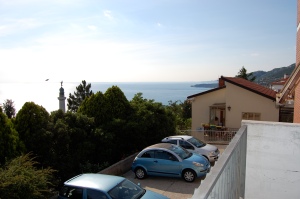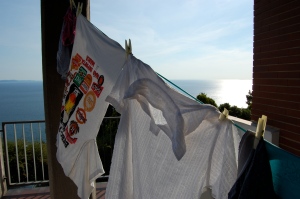I finished reading Tahmima Anam’s A Golden Age today – and will write about it tonight if I get the chance. But at dinner this evening, my daughter sat next to me and said, ‘So mum, how’s it going?’ in a jokey adult sort of way. I told her that actually my head was still in the story I’d just finished reading. I said that I had met the woman who wrote it, that she was a student on the M.A. at Royal Holloway while I was teaching there temporarily and that it turned out later, she was going out with one of my oldest friend’s brothers … It was the hook my daughters needed: ‘wow! really! what’s the story about?’ So I tried to tell them, imagining it would be far too complicated to explain. But actually the nuggets of the story rolled from my mouth and I felt gifted like Sheherazade, and I appreciated all over again the story itself, without the distraction of the perfect wording.
‘It’s a story about a country called Bangladesh and the war when they tried to become independent.’
‘What’s independent?’ piped up my 6 year old.
‘When you want to do something on your own, without other people being in charge, and this country didn’t want to belong to Pakistan anymore. But it’s also a story about a mother whose children get taken away from her and she does whatever she can to get them back.’ And I just carried on telling them the story, including how Rehana was too poor to look after her children and her brother-in-law took them himself to another country a thousand miles away because his own wife couldn’t have children, but Rehana promised she would bring them back, and one day her friend suggested she could build a big house in her own garden and rent it out for money. And she went to get a loan from the bank but the man wanted to kiss her and she didn’t like that so she left the bank with no money and instead she found a very rich blind man who had married a very young woman who had died after only three years and he was looking for another wife and he said to Rehana that he would marry her if she didn’t mind him keeping a big portrait of his wife in the house… it is such a story, in its contortions and circular patterns, each end finding its beginning. And they loved it!
‘Will you read it to us mummy?’ I said I’d give it a go, I wasn’t sure if they’d understand it – and it might be very upsetting. But they insisted. So I read the first few pages to them snuggled up in bed. From the very beginning my little one was in tears.
‘Why did the children have to go away, mummy?’ It was a heartfelt horror-filled question. And the only way I could hope to dispel the nightmares that might come was by making up a story for her, a different kind altogether.
‘What shall I tell you a story about?’ I asked her.
‘About a rabbit and a raspberry.’
‘Okay’ I said.
So here it is…
The Rabbit and the Raspberry
Once upon a time there was a rabbit called Riccardo who absolutely loved raspberries. But this year, 1971 [you see, I was still a little bit in the story of Bangladesh], there were very few raspberries to be found. There was a severe drought for one thing, and for another, the gulumphalumph was eating them all up. The gulumphalumph was a very odd looking creature: he had three ears, a long tail, short stubby legs and a long waffly nose. But he could bounce and spring on his legs, and he could rustle along the ground. This meant he was exceptionally good at finding raspberries. He could jump up to the highest thorny places and stick out his long sticky tongue and swallow them whole, or he could snuffle under the leaves and find them where other bunnies couldn’t.
But the galumphalumph didn’t particularly like raspberries and he was very lonely. None of the bunnies would play with him. They thought he must belong with some different animals, that looked like him. But the fact was, there were no other animals like him anywhere. So he continued collecting raspberries.
Meanwhile, Riccardo the Rabbit was getting quite desperate for a raspberry. The fewer he found, the more he wanted. He began hallucinating, imagining that he could see a raspberry before him, and he would swipe out his paw to pick it, but there was nothing there! All the other bunnies would laugh at him, so he would pretend he was playing a game, and soon all the bunnies were joining in, swiping the air with their paws. But Riccardo didn’t enjoy the game. He had become addicted to the idea of the sweet juice of raspberries trickling down his throat.
Now the galumphalump heard about Riccardo and so he collected thirty of the juiciest, purply-pinkest raspberries he could find and placed them carefully in his best bowl. Then he arranged some leaves around the top, placed the bowl on a cushion and placed the cushion behind a curtain. Then he wrote an invitation to Riccardo,
Dear Riccardo,
Please come to tea at my house tomorrow at 5. There will be something to eat that I know you like very much,
The Galumphalumph.
Riccardo wanted to tear the letter up. Tea with the galumphalumph. What an absurd idea! All the rabbits knew you didn’t mix with the galumphalumph! But ‘something to eat that I know you like very much’ – what could that be but raspberries! He must go, just in case. And that night, in his sleep he drooled, as he dreamt of raspberries galore.
At 5 the next day, he arrived at the galumphalumph’ s house – a cave scratched out of a tree trunk , with a carpet of moss and ivy hanging in the doorway. The galumphalumph wasted no time.
‘Welcome Riccardo, come inside, and see what I have for you.’
And he swept back the little curtain and Riccardo couldn’t believe his eyes. He thought, again, that he must be hallucinating and he didn’t dare swipe his paw and get laughed at by the galumphalumph of all creatures. So the galumphalumph took one of the biggest, best raspberries and begged Riccardo to try it. Riccardo opened his mouth, shut his eyes and the juice, just as he’d imagined, trickled down his throat.
‘These are all yours,’ said the galumphalumph, ‘on one condition…’
Humph, I knew it! thought Riccardo.
‘That you come here everyday at 5 to have tea with me.’
‘Oh – and what will there be for tea?’ asked Riccardo, suspiciously.
‘Raspberries. Just like these.’
What! This must be a trick. Why ever would the galumphalumph give him what he really wanted for nothing in return. No, Riccardo turned his back on the creature and left with a haughty, ‘Thank you, but no. I don’t like raspberries.’
A little bunny had been listening outside. This bunny also had a weakness for raspberries. He knocked on the tree trunk.
‘Excuse me Mr Galumphalumph, but I will be very happy to come to your house every day at 5 for tea.’
The Galumphalumph was overjoyed. And so he had a friend. And the bunny had his tea.
Riccardo was left only with his suspicions.
Read Full Post »



